
Introduction
In the dynamic world of event planning, efficiency and precision are paramount. With the increasing complexity of managing various aspects of events, from registration to post-event analysis, online platforms have emerged as indispensable tools for event planners. These platforms offer comprehensive solutions that streamline the entire process, enhance the attendee experience, and provide valuable insights. For instance, the XYZ conference, which saw a 30% increase in registrations and a 20% decrease in administrative overhead, was successfully managed using an online platform.
The ability to manage event logistics efficiently can make or break an event. Online platforms, with their user-friendly interfaces, offer a sigh of relief to event planners. Attendees can sign up quickly and easily, saving time for both the planners and the participants. This streamlined process also reduces the likelihood of errors that can occur with manual registration processes, further easing the burden on event planners.
Moreover, these platforms often come with built-in marketing and communication tools, enabling planners to reach a broader audience through targeted campaigns and personalized messages. Real-time updates and notifications keep attendees informed and engaged, improving overall satisfaction and attendance rates.
Essential Features of Online Platforms

Event Creation and Customization Tools
Online platforms offer robust tools for creating and customizing events. Planners can tailor every aspect of the event, from the agenda to the branding, ensuring that the event reflects the desired theme and tone. These tools often include drag-and-drop interfaces, templates, and customizable widgets, making designing an event website that captivates attendees easy.
Registration and Ticketing Management
Managing registrations and ticketing can be daunting, but online platforms simplify this process significantly. They allow for seamless registration, ticket sales, and tracking. Planners can create multiple ticket types, set pricing tiers, and offer discounts or early bird rates. Automated confirmation emails and ticket delivery add convenience for attendees.
Payment Processing and Financial Tracking
Secure and efficient payment processing is important for any event. Online platforms seamlessly integrate with various payment gateways, enabling attendees to pay via credit cards, PayPal, and other methods. These platforms also offer financial tracking tools that help planners monitor revenue, track expenses, and generate financial reports, ensuring transparency and accountability. The integration process is straightforward, requiring minimal technical knowledge and ensuring compatibility with existing event management systems.
Communication Tools for Email and Notifications
Effective communication is critical to a successful event. Online platforms come equipped with tools for sending emails and notifications to attendees. Planners can send reminders, updates, and personalized messages to keep attendees informed and engaged. Automated workflows ensure timely communication without the need for constant manual intervention.
Analytics and Reporting Features
Planners need access to detailed analytics and reports to measure an event's success. Online platforms provide insights into registration numbers, attendee demographics, ticket sales, and more. These analytics help planners understand what worked well and what needs improvement, enabling data-driven decision-making for future events.
Streamlining the Event Planning Process
Centralized Data Management
One of the primary advantages of online platforms is centralized data management. All information related to the event, including attendee details, registration status, and payment information, is stored in a single location. This centralization facilitates easy access, updates, and management, reducing the risk of errors and ensuring consistency.
Real-time Updates and Collaboration Tools
Event planning often involves multiple team members working on different tasks. Online platforms support real-time updates and collaboration, allowing team members to collaborate seamlessly. Changes made by one team member are instantly reflected, ensuring everyone is on the same page. Collaboration tools like shared calendars, task lists, and messaging systems enhance coordination.
Automated Tasks and Reminders
Automation is a game-changer in event planning. Online platforms automate repetitive tasks such as sending reminders, updating registration lists, and processing payments. Automated reminders for important deadlines, such as early bird registration cutoffs or payment due dates, help ensure everything runs smoothly.
Integrated Marketing Tools for Promotion
Promoting an event effectively is crucial for its success. Online platforms often include integrated marketing tools that enable planners to promote their events through email campaigns, social media, and SEO. These tools help attract a larger audience and boost registration numbers, making marketing efforts more efficient and impactful.
Cost Benefits
Reduction in Administrative Overhead
By automating many administrative tasks, online platforms significantly reduce the need for manual labor. This reduction in administrative overhead translates to cost savings, as fewer staff members are needed to handle tasks such as registration, ticketing, and communication.
Lower Costs for Printing and Manual Labor
Traditional event planning often involves significant printing costs for tickets, brochures, and registration forms. Online platforms eliminate the need for these physical materials by digitizing the entire process. This shift not only saves money but also supports environmentally friendly practices.
Potential for Increased Revenue Through Online Ticket Sales
Online platforms provide various tools to maximize revenue from ticket sales, offering a ray of hope to event planners. Features such as dynamic pricing, discount codes, and upselling opportunities encourage more ticket purchases and higher sales volumes. Additionally, the ease of online transactions can lead to impulse buys and increased overall revenue, painting a promising picture for the event's success.
Savings on Marketing Through Digital Channels
Digital marketing is often more cost-effective than traditional methods. Online platforms enable planners to leverage digital channels, such as email marketing, social media, and online ads, to promote their events. These channels are cost-effective and allow for targeted marketing, reaching the right audience more efficiently.
Improving Attendee Experience
Easy and Convenient Registration Process
The registration process sets the tone for the attendee experience. Online platforms offer intuitive and user-friendly registration forms that attendees can complete quickly and easily. Mobile compatibility ensures attendees can register on the go, enhancing convenience and accessibility.
Personalized Communication and Updates
Personalized communication makes attendees feel valued and engaged. Online platforms allow planners to send customized emails, updates, and reminders based on attendee preferences and behavior. This customized approach enhances attendee satisfaction and fosters a positive relationship with the event.
Mobile Access to Event Details and Schedules
In today’s mobile-centric world, having mobile access to event details is essential. Online platforms offer mobile apps and responsive websites that give attendees real-time access to event schedules, speaker information, maps, and more. This accessibility ensures that attendees have all the information they need at their fingertips.
Enhanced Networking Opportunities Through Event Apps
Networking is a key component of many events, and online platforms are here to enhance it. With features such as attendee directories, messaging systems, and social media integration, these platforms provide a robust networking environment. Attendees can connect, schedule meetings, and build valuable relationships, adding significant value to the event and boosting event planners' confidence in their event's success.
Security and Data Privacy
Ensuring Secure Transactions
Security is a top priority for any event involving online transactions. Online platforms use advanced encryption and security measures to protect payment information and ensure secure transactions. These measures help build trust with attendees, encouraging them to register and pay online.
Protecting Attendee Information
Attendee data privacy is critical. Online platforms adhere to strict data protection protocols to safeguard personal information. Compliance with regulations such as GDPR ensures that attendee data is handled responsibly, reducing the risk of data breaches and enhancing trust.
Compliance with Data Protection Regulations
Online platforms are designed to comply with various data protection regulations, providing peace of mind to event planners. Compliance features include secure data storage, consent management, and regular security audits. These measures ensure the platform adheres to legal requirements and protects attendee data.
Customization and Personalization
Tailoring the Event Experience to Attendees
Customization allows planners to create a unique and memorable event experience. Online platforms offer tools for personalizing various aspects of the event, from registration forms to event agendas. Planners can tailor the experience to meet their attendees' specific needs and preferences.
Customizable Registration Forms and Badges
Customizable registration forms enable planners to collect the specific information they need from attendees. This flexibility ensures that the registration process aligns with the event’s requirements. Additionally, customizable badges enhance the professional appearance of the event and facilitate easy identification of attendees.
Personalized Agendas and Schedules
Online platforms allow attendees to create personalized agendas and schedules based on their interests. This feature ensures that attendees can make the most of their time at the event, attending the sessions and activities that are most relevant to them.
Feedback and Post-Event Analysis
Collecting Attendee Feedback
Gathering feedback is essential for improving future events. Online platforms provide tools for collecting attendee feedback through surveys, polls, and questionnaires. This feedback helps planners understand attendee satisfaction and identify areas for improvement.
Analyzing Event Success
Post-event analysis is crucial for measuring an event's success. Online platforms offer detailed analytics and reports that help planners evaluate various aspects of the event, such as attendance, engagement, and financial performance. These insights inform future event planning and decision-making.
Implementing Improvements for Future Events
Using the feedback and analytics gathered, planners can make informed decisions about improvements for future events. Online platforms provide the data needed to understand what worked well and what didn’t, enabling continuous improvement and ensuring the success of future events.
Popular Online Platforms
1. Eventbrite
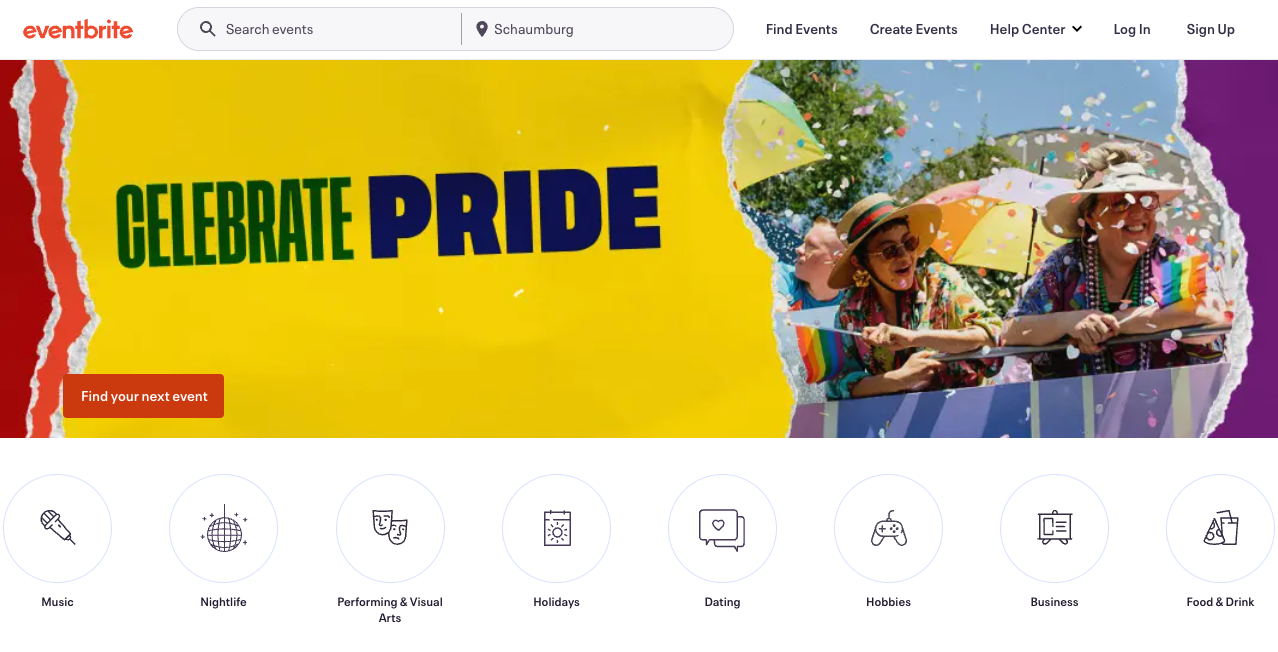
Eventbrite is a popular platform known for its user-friendly interface and robust features. It offers comprehensive event creation, registration, ticketing, and promotion tools. Eventbrite is suitable for events of all sizes and types, making it a versatile choice for event planners. Its intuitive dashboard allows users to set up events quickly, customize registration forms, and create ticket types, including free, paid, and donation-based options.
One of Eventbrite's standout features is its powerful promotional tools. Planners can easily integrate their events with social media platforms, send personalized email invitations, and use Eventbrite’s built-in SEO capabilities to increase event visibility. Additionally, Eventbrite offers advanced analytics and reporting, providing insights into ticket sales, attendee demographics, and engagement levels. Eventbrite also supports seamless check-in processes with its mobile app, which includes barcode scanning and real-time attendance tracking. This ensures a smooth experience for both organizers and attendees. Furthermore, the platform integrates with numerous third-party applications, such as CRM systems and marketing tools, allowing for enhanced functionality and streamlined operations.
For virtual events, Eventbrite offers integrations with various webinars and live-streaming services, making hosting and managing online gatherings easy. “The platform's robust customer support and extensive resources, including webinars and tutorials, further assist event planners in maximizing the potential of their events”, says Matthew Holland, Head of Marketing at WellPCB. Eventbrite stands out as a comprehensive solution that simplifies event management while offering extensive customization and promotional capabilities, catering to the diverse needs of modern event planners.
2. Cvent
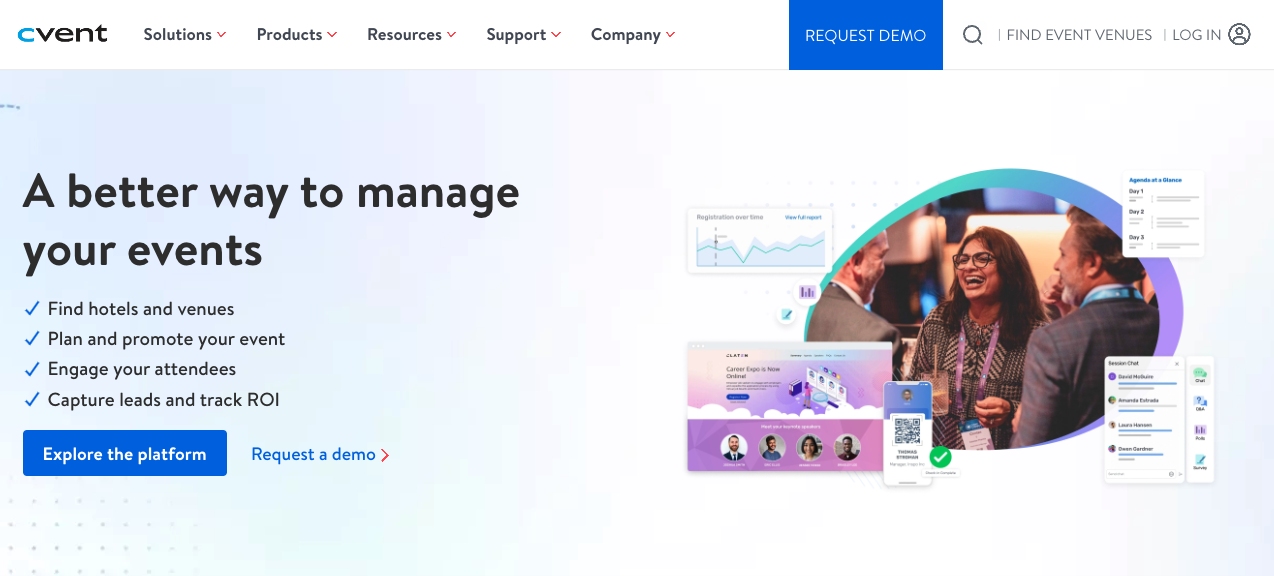
Cvent is a leading event management platform that offers a wide range of features, including event registration, venue selection, and event marketing. Cvent is particularly popular for corporate events and conferences. The platform provides detailed tools for sourcing venues, managing budgets, and coordinating logistics, making it a comprehensive solution for large-scale events.
One of Cvent's key strengths is its robust data management capabilities. “Planners can access real-time data analytics and reporting, which help in tracking registration trends, attendee engagement, and overall event performance,”, says Sai Blackbyrn, CEO of Coach Foundation. This data-driven approach enables event planners to make informed decisions and improve the effectiveness of their events. Cvent also offers powerful marketing automation tools, allowing planners to create and manage email campaigns, track engagement metrics, and optimize outreach strategies. The platform's attendee engagement features, such as personalized schedules and interactive floor plans, enhance the overall experience for participants.
Additionally, Cvent integrates with various third-party applications, including CRM systems, marketing tools, and payment gateways, providing a seamless and efficient event management process. The platform's extensive customer support, including 24/7 assistance and a comprehensive knowledge base, ensures event planners have the necessary resources to succeed.
3. Bizzabo
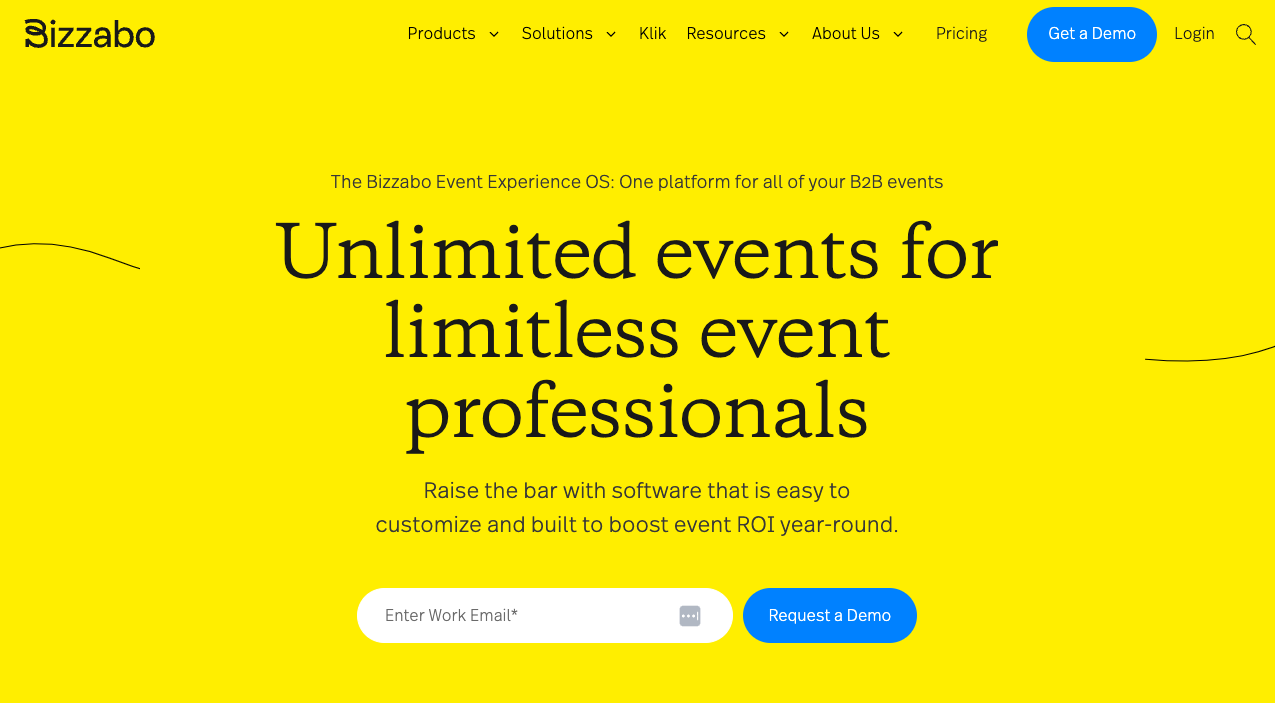
Bizzabo is known for its focus on enhancing attendee engagement. It offers personalized agendas, networking tools, and mobile apps. Bizzabo is ideal for planners creating a highly interactive and engaging event experience. The platform's user-friendly interface allows planners to quickly design and manage events, while its advanced analytics provide valuable insights into attendee behavior and preferences.
“One of Bizzabo's standout features is its networking tools, facilitating meaningful connections between attendees. The platform offers matchmaking algorithms, chat functionalities, and one-on-one meeting scheduling, helping participants maximize their networking opportunities. Bizzabo's mobile app is another key feature, providing attendees real-time access to event information, personalized schedules, and interactive maps. This enhances the overall event experience by ensuring that participants have all the information they need at their fingertips”, says Paul Posea, Outreach Specialist at Superside.
In addition to its engagement features, Bizzabo offers robust event marketing tools, including email campaign management, social media integration, and SEO optimization. The platform's comprehensive reporting and analytics tools enable planners to measure the success of their marketing efforts and make data-driven decisions. Overall, Bizzabo's focus on attendee engagement and its powerful marketing and analytics capabilities make it an excellent choice for planners looking to create interactive and memorable events.
4. Whova
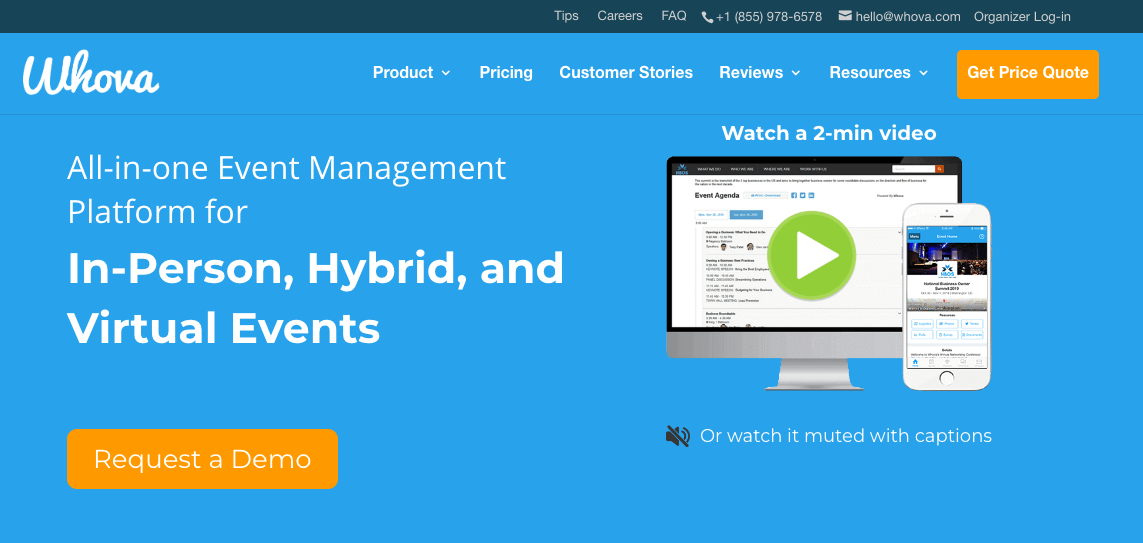
Whova offers an all-in-one solution for event management, including registration, ticketing, and attendee engagement. Its mobile app is highly rated for its ease of use and comprehensive features, making it a popular choice for various events. Whova's platform allows planners to easily create and manage events, from initial registration to post-event feedback.
One of Whova's key features is its attendee engagement tools, which include live polling, Q&A sessions, and networking opportunities. These features help to create an interactive and engaging experience for participants, encouraging active involvement throughout the event.
“Whova's mobile app gives attendees real-time access to event information, including schedules, speaker bios, and venue maps. This ensures that participants have all the information they need, enhancing their overall event experience. The platform also offers robust event marketing tools, including email campaign management, social media integration, and promotional widgets. Planners can easily track the success of their marketing efforts and optimize their strategies based on real-time data”, says Jay Barton, Founder and CEO at ASRV.
Whova's analytics and reporting tools provide valuable insights into attendee behavior and event performance, helping planners make data-driven decisions and improve future events. The platform's seamless integration with various third-party applications, including CRM systems and payment gateways, further enhances its functionality and efficiency. Overall, Whova's comprehensive event management solution, with its focus on attendee engagement and ease of use, makes it a top choice for event planners looking to create successful and memorable events.
5. Ticket Tailor
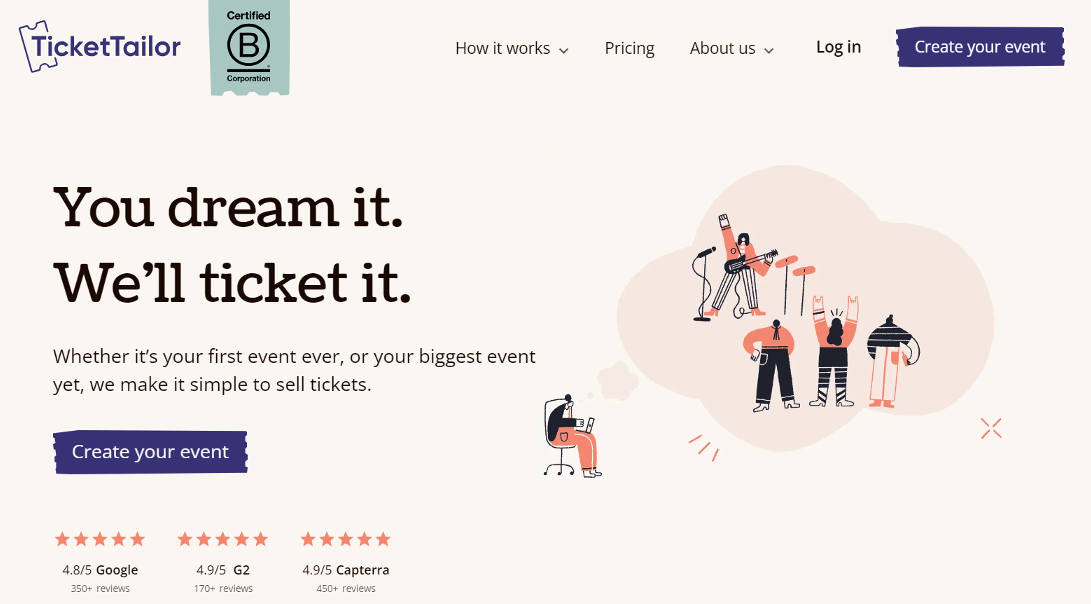
Ticket Tailor is a cost-effective platform that provides straightforward ticketing solutions. It is known for its low fees and simplicity, making it an excellent choice for smaller events and non-profit organizations. The platform's user-friendly interface lets planners quickly set up events, customize ticket types, and easily manage sales.
One of Ticket Tailor's standout features is its flexible pricing structure, which includes no per-ticket fees. This makes it an affordable option for organizers looking to maximize their event budget. The platform also offers a range of customization options, allowing planners to create branded ticket pages and integrate them with their websites. “Ticket Tailor provides robust reporting and analytics tools, enabling planners to track ticket sales, monitor attendance, and gain insights into their audience. These tools help organizers make informed decisions and improve the effectiveness of their events”, says Scott Trachtenberg, CEO of ADA Site Compliance.
The platform also supports seamless integration with various third-party applications, including CRM systems, marketing tools, and payment gateways. This ensures a smooth and efficient ticketing process, from initial sales to on-site check-ins. Overall, Ticket Tailor's affordability, simplicity, and robust features make it an ideal choice for smaller events and non-profit organizations looking for a straightforward, cost-effective ticketing solution.
6. Eventzilla
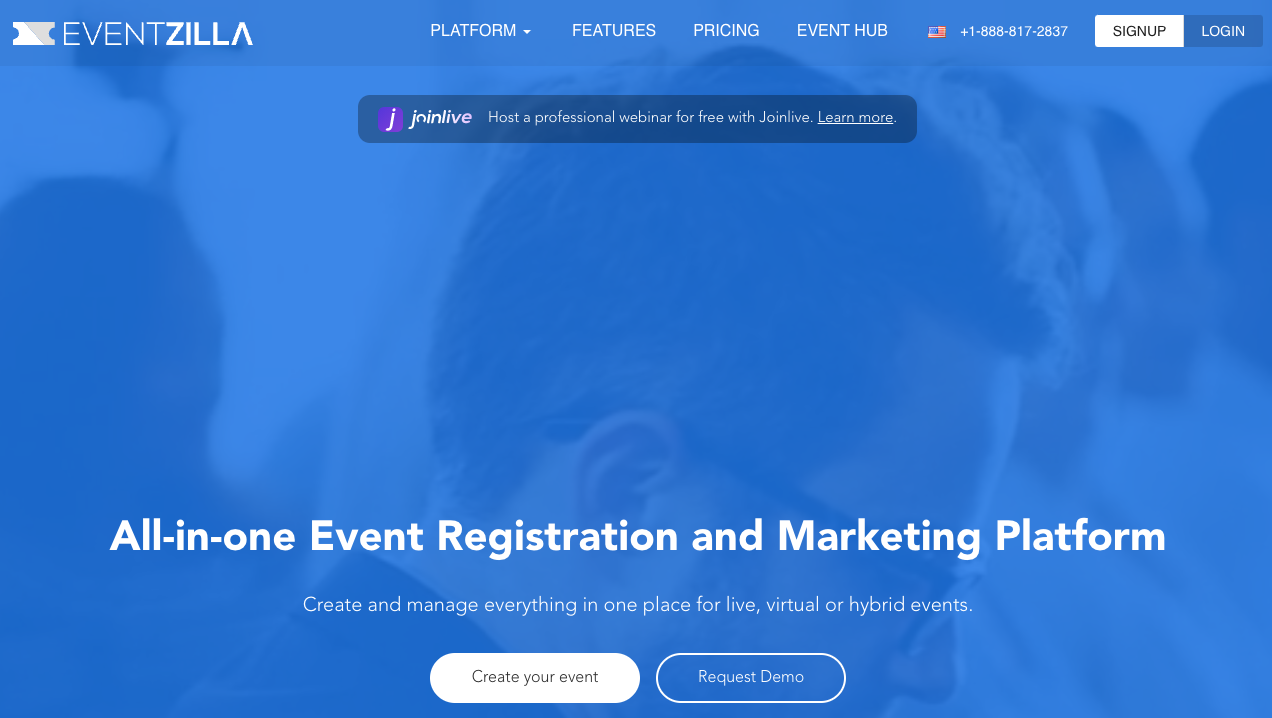
Eventzilla is a versatile online platform designed to streamline the process of event registration and management. It caters to a wide range of events, including conferences, workshops, seminars, fundraisers, and more. With its intuitive interface and robust feature set, Eventzilla aims to simplify the event planning process for organizers and enhance the experience for attendees. Eventzilla allows organizers to create professional and branded event pages with ease. Users can customize these pages to include event details, images, videos, and custom branding elements. The platform also supports various themes and templates to ensure that each event page aligns with the event's aesthetic and branding.
“Eventzilla offers a variety of ticketing options to suit different event needs. Organizers can create multiple ticket types, such as early bird, VIP, group discounts, and more. The platform also supports tiered pricing, allowing for different prices based on ticket type or purchase date. Additionally, Eventzilla provides options for discount codes and promotional offers to attract more attendees. The registration process on Eventzilla is designed to be straightforward and user-friendly. Attendees can easily register for events through the custom event pages”, says Maxime Bouillon, Co-founder of Archie. The platform supports multiple payment gateways, including credit cards, PayPal, and Stripe, ensuring secure and convenient transactions for users worldwide.
For event day management, Eventzilla offers tools such as mobile check-in apps, QR code ticket scanning, and badge printing. These features help streamline the check-in process, reduce wait times, and ensure a smooth experience for attendees. The platform also supports real-time attendee tracking, allowing organizers to monitor attendance and engagement during the event. Eventzilla integrates with a variety of third-party applications, including CRM systems, email marketing tools, and payment gateways. This ensures that organizers can seamlessly connect Eventzilla with their existing tools and workflows. The platform also offers a robust API, enabling developers to build custom integrations and extend the platform's functionality.
7. RegFox
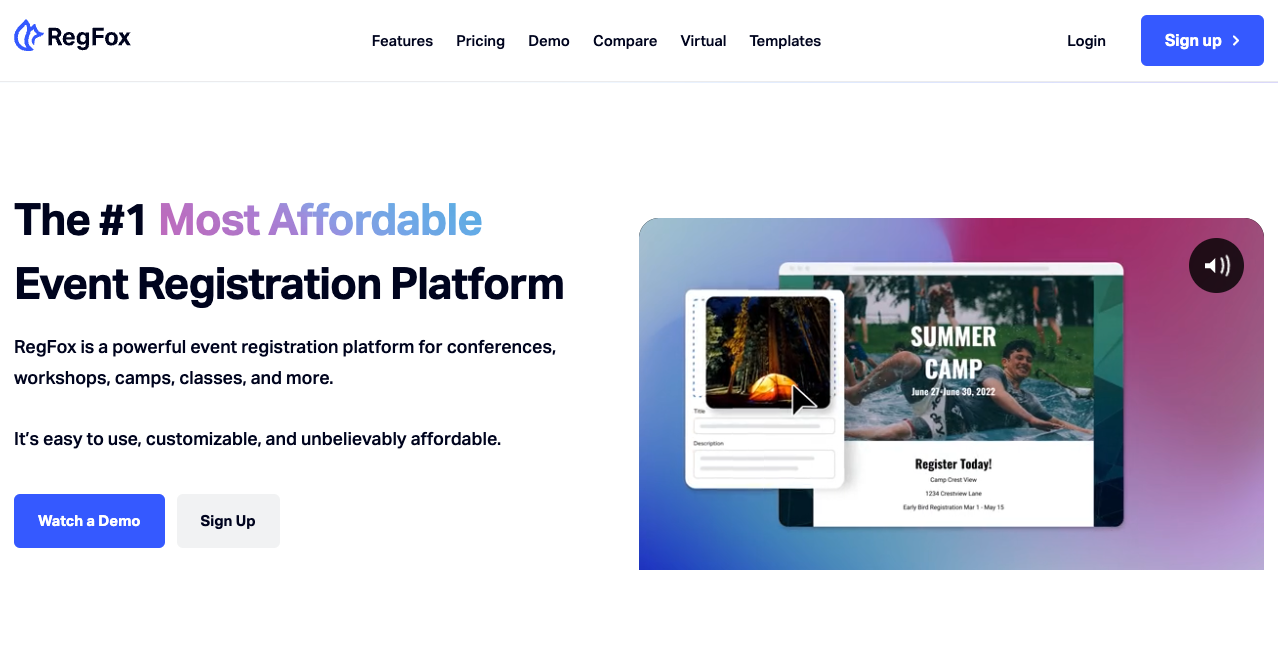
RegFox is a powerful and flexible event registration platform designed to cater to the diverse needs of event organizers. It offers a highly customizable interface that enables users to create tailored event pages, manage registrations, and streamline event planning processes. RegFox stands out for its user-friendly design, affordability, and robust feature set, making it an excellent choice for events ranging from small workshops to large conferences. With RegFox, organizers can design unique and visually appealing registration sites using drag-and-drop functionality, allowing them to add event details, images, videos, and custom branding elements effortlessly. The platform's flexible pricing structure supports various ticket types, including early bird, standard, VIP, and group rates, and integrates with multiple payment gateways like Stripe and PayPal for secure and convenient payment processing.
The registration process is seamless and straightforward, featuring custom registration forms to collect specific information from attendees, ensuring a smooth experience for both organizers and participants. “RegFox's advanced attendee management tools enable real-time registration tracking, attendee list exporting, and easy check-in management. The platform also includes marketing and promotion tools, integrating with popular social media channels and email marketing campaigns, and offers SEO-friendly event pages to reach a broader audience. For onsite management, RegFox provides mobile check-in apps, QR code ticket scanning, and badge printing, enhancing the overall attendee experience and ensuring efficient event day operations. Additionally, RegFox integrates with various third-party applications and offers a comprehensive API for custom integrations”, says Gil Dodson, Owner of Corridor Recycling.
The platform emphasizes security and compliance, adhering to industry standards and GDPR. With an intuitive dashboard and user-friendly design, RegFox ensures easy navigation and management for organizers and a smooth registration process for attendees. Extensive support and resources, including a knowledge base, video tutorials, live webinars, and dedicated customer support, help users maximize the platform's potential. RegFox's transparent and affordable pricing model charges a flat fee per registration with no hidden costs, making it a cost-effective option for organizers of all event sizes. Overall, RegFox is a versatile and robust event registration and management platform, providing the tools and support needed to ensure the success of any event, whether it's a small workshop or a large conference.
8. EventMobi
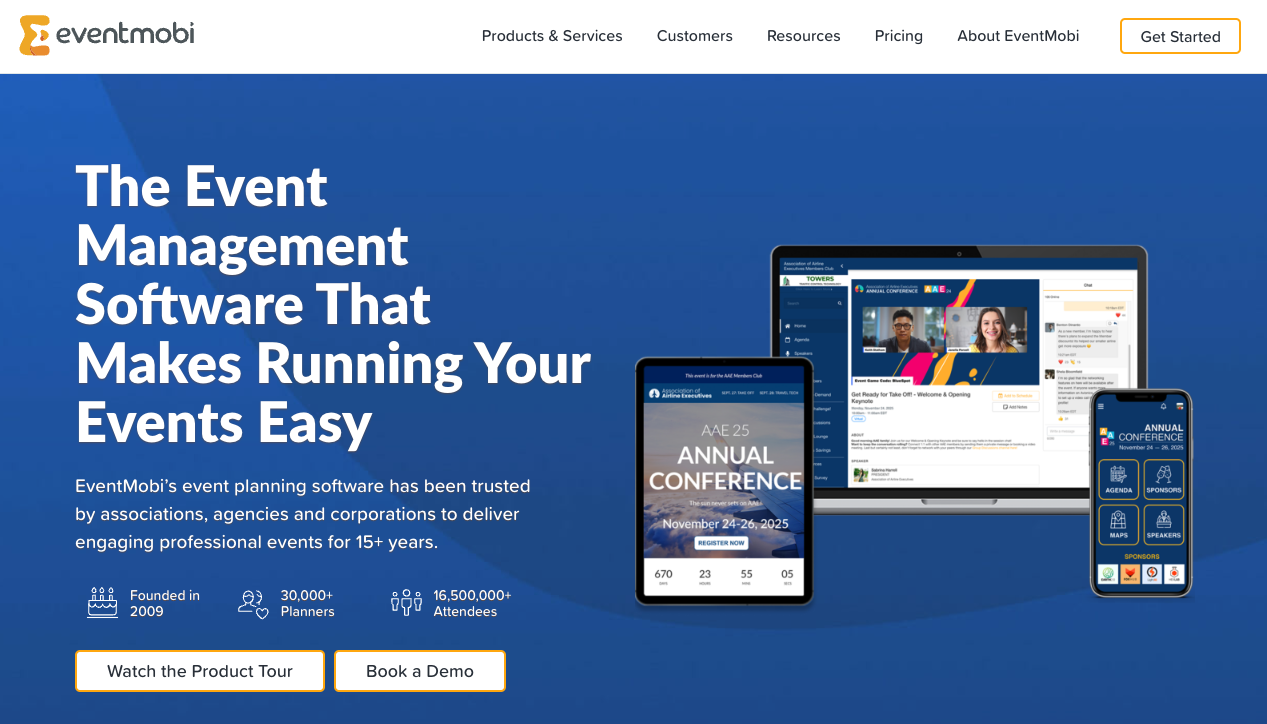
EventMobi is a comprehensive event management platform designed to enhance the entire event lifecycle, from planning and promotion to execution and post-event analysis. Known for its versatility and user-friendly interface, EventMobi caters to a wide range of events, including conferences, trade shows, corporate meetings, and virtual events. The platform's robust feature set and customization options make it a preferred choice for event organizers looking to create engaging and memorable experiences for their attendees.
“One of the standout features of EventMobi is its highly customizable event apps. These apps allow organizers to deliver personalized experiences to attendees, providing them with access to schedules, speaker information, session details, maps, and more, all from their mobile devices. The platform supports interactive features such as live polling, Q&A sessions, and surveys, which help engage attendees and gather valuable feedback in real time. Additionally, EventMobi’s networking tools facilitate attendee interactions through chat, matchmaking, and virtual meeting scheduling, enhancing the overall event experience”, says Maham Khan, Head of Marketing at EVSTOR.
EventMobi also excels in its event marketing and promotion capabilities. Organizers can create branded event websites with ease, using drag-and-drop tools to add content, images, videos, and registration forms. The platform integrates with major social media channels and email marketing systems, enabling seamless promotion and outreach. EventMobi’s analytics and reporting tools provide deep insights into attendee behavior, engagement levels, and overall event performance, helping organizers measure success and identify areas for improvement. Furthermore, EventMobi supports both in-person and virtual events, offering features like live streaming, on-demand content, and virtual exhibitor booths, making it a versatile solution for the evolving needs of event management.
Comparison of Features and Pricing
When choosing an online platform, planners should consider the specific needs of their event. Factors such as budget, event size, and required features should guide the decision. Comparing features and pricing of different platforms can help planners select the best option for their event.
Conclusion
Online platforms for event registration and management offer a multitude of benefits that can transform the event planning process. From streamlining administrative tasks to enhancing attendee experience, these platforms provide comprehensive solutions that save time, reduce costs, and improve efficiency. By leveraging the power of online platforms, event planners can ensure the success of their events and create memorable experiences for their attendees.
Embrace the digital age and make the most of these innovative tools to elevate your event planning to new heights.
Share this post
Leave a comment
All comments are moderated. Spammy and bot submitted comments are deleted. Please submit the comments that are helpful to others, and we'll approve your comments. A comment that includes outbound link will only be approved if the content is relevant to the topic, and has some value to our readers.


Comments (0)
No comment